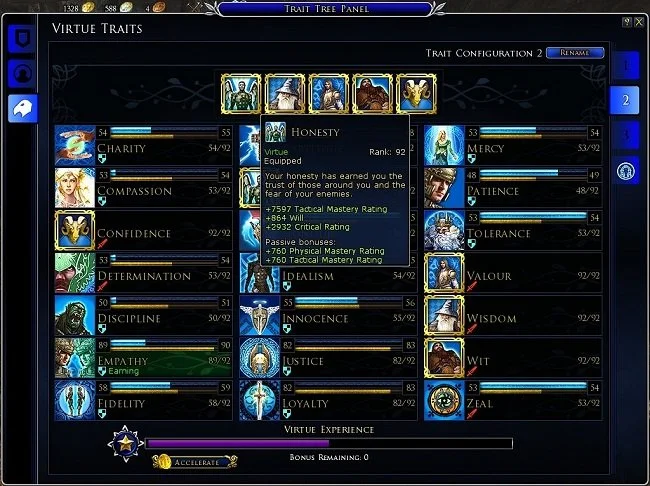Is It Time to Rebrand the MMORPG Genre?
According to Wikipedia, a massively multiplayer online role-playing game (MMORPG) is a video game that combines aspects of a role-playing video game and a massively multiplayer online game. 15 years ago, the MMORPG was an established and popular video game genre. It seemed that every developer wanted a title like World of Warcraft in their portfolio and were happy to sink millions of dollars into making one. WoW at the height of its popularity had over 10 million subscribers and annual turnover of over a billion dollars in the US alone. Sadly, no one ever came close to creating a WoW killer, a game that had found success through a perfect storm of events. Today the MMO genre has become synonymous with being a time sink and a grind. The universal adoption of the free-to-play business model further compounds the negative connotations associated with these types of games. Simply put MMOs are no longer seen as a licence to print money.
Hence we now find ourselves in a world where games that are definitely MMORPGs are rebranding and attempting to present themselves as something else. Guild Wars 2 is currently marketed on Steam as a “online RPG”. New World is to be launched on consoles on 15th October under the revised name of New World: Aeturnum. The marketing for the game now refers to it as a “action RPG” and the online aspect is presented as “co-op play”. Similarly, ArcheAge2 which has been rebranded as ArcheAge Chronicles, goes out of its way to avoid using the term MMORPG in its promotional material. It will be interesting to see exactly what genre it ultimately claims to be when it is released in 2025. Even the doyen of the genre, Raph Koster, who worked on Ultima Online and Star Wars: Galaxies has dodged calling his latest game an MMO. Stars Reach is described as a “massively multiplayer sandbox RPG” on its official website. So near but not quite an MMO, then.
Some gamers may argue that this doesn’t matter. It’s just marketing speak and there is a degree of truth in such a position. It has also been pointed out by many gamers and journalists over the years, that the term massively multiplayer online role-playing game is both cumbersome and inaccurate. I have written blog posts in the past about how we need to update and revise the existing gaming lexicon, as game genres and mechanics are constantly changing. Language doesn’t stay still in other areas of life. Why should it do so in the gaming community? However, setting linguistics aside, I think there are two very clear reasons why the MMO genre is perceived as being after its “best before date”. One is a matter of context within internet history. The other is a matter of perception. The former is a question of fact. The latter is more complex as perceptions are not always correct. However, mud sticks.
In the late nineties, the internet was still novel. The idea that you could communicate in real time with people all over the world was genuinely exciting. Hence the idea of playing a game in a shared environment, where the other avatars were actually real people, was revolutionary. My first exposure to this unique gaming experience was playing Air Warrior. This positive perception of the internet persisted possibly for a decade. By 2010 the MMO market was becoming saturated and the internet had gone from being a quaint, niche market talking point, to an utterly ubiquitous medium that was slowly becoming dominated by corporate interests. As a genre, the MMO had changed from being a player dependent platform for emergent gameplay, to a interactive but firmly on rails, gaming experience. As more and more players eschewed playing collaboratively many games effectively evolved into online RPGs with optional co-op play.
As to why the player base shifted away from group content, there isn’t a single smoking gun that explains it all. However, raid culture often leads to elitism, which then fuels toxicity in gaming communities. Gaming has also become a far more widespread pastime over the decades, so MMO content had to become more accessible and less gated behind group play, for straightforward business reasons. As mentioned previously, we are now at a point where certain gaming terms, rightly or wrongly, come with a lot of baggage. If you speak to a gamer who primarily plays Call of Duty or a sporting franchise such as FIFA, they will often see the MMORPG genre as something “old fashioned”. Games that are graphically dated, filled with convoluted systems that require years to master. There is also a great deal of association with “pay to win” mechanics and egregious in-game stores which “nickel-and-dime” players. There is also a perception that the communities associated with MMOs are “weird”.
When you step back and consider these things, regardless of whether they’re true or not, you can see why both players, developers and publishers may not want to be associated with the acronym MMORPG. Therefore, we again return to the subject of rebranding the genre and coming to terms that some words, phrases and indeed concepts become obsolete overtime. Exactly what the new description for an MMO should be, I’m not entirely sure. A game such as The Lord of the Rings Online, can be defined as an online action role playing game with optional cooperative play. Dedicated raiders may argue otherwise but their gaming experience is not that same as other players and they are far from the majority. Ultimately, as long as the terminology used to describe a game is accurate then I’m not resistant to change. If we have to say goodbye to the acronym MMORPG, so be it. It’s not as if we’re saying goodbye to the games themselves.






























